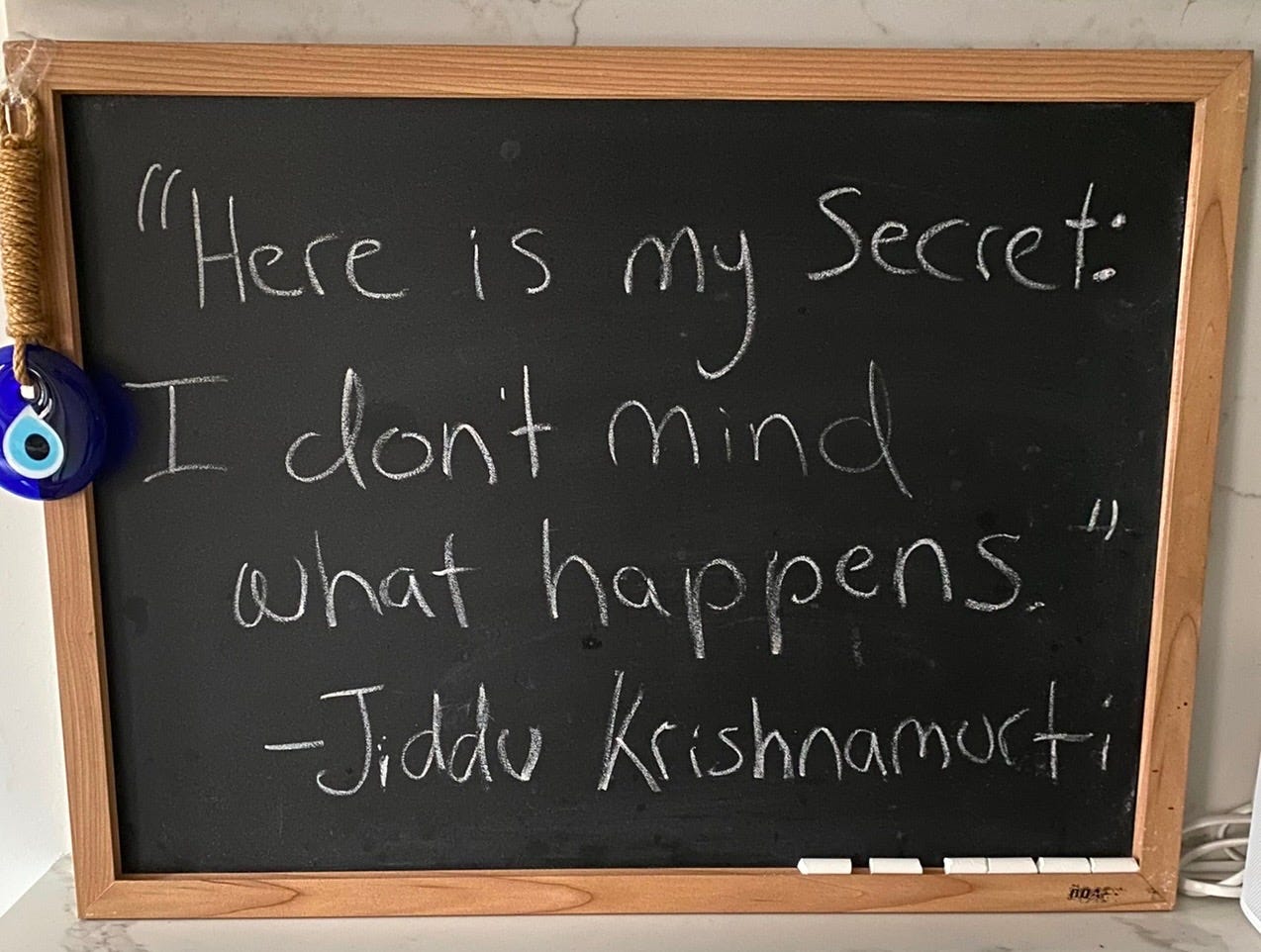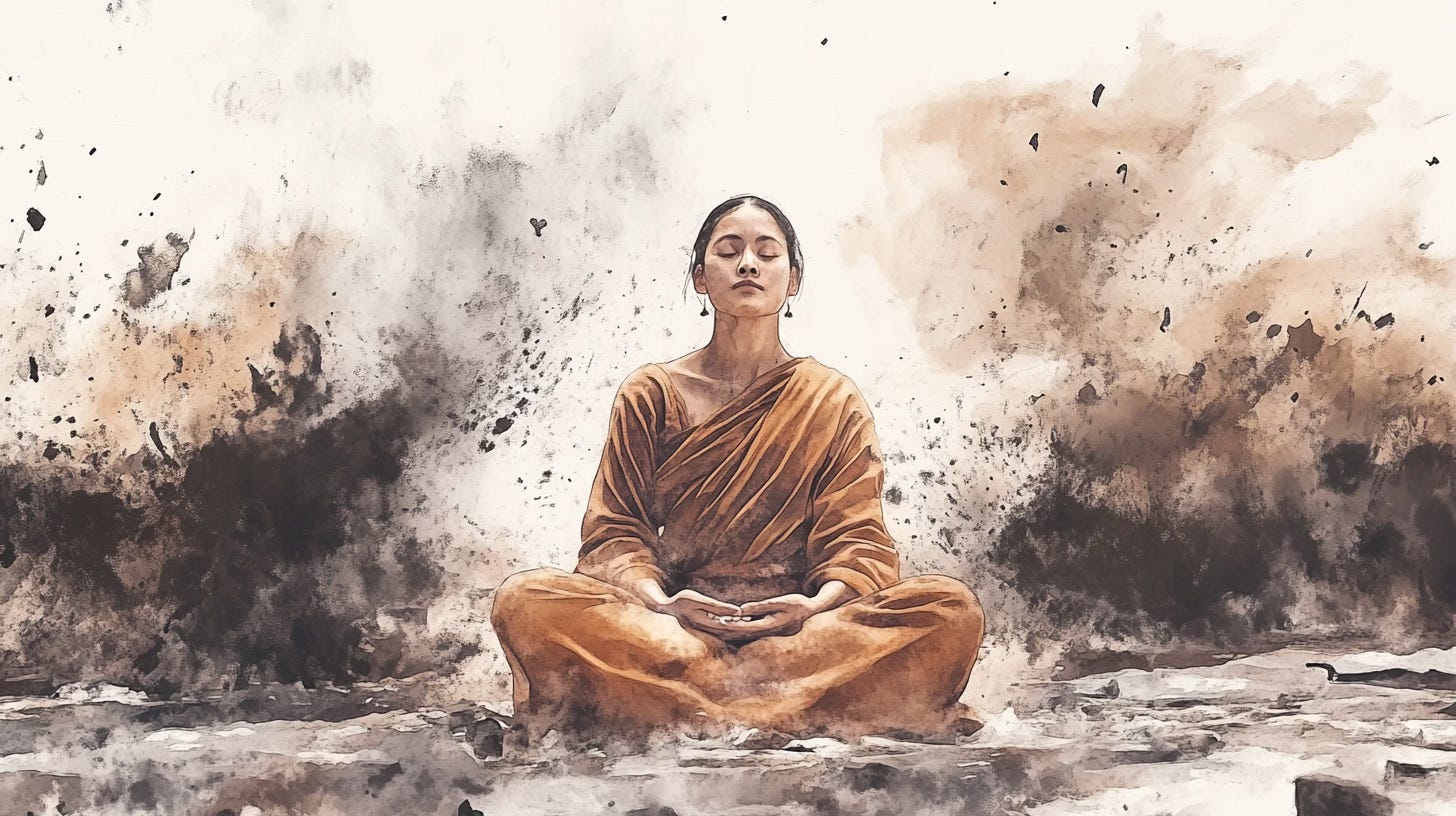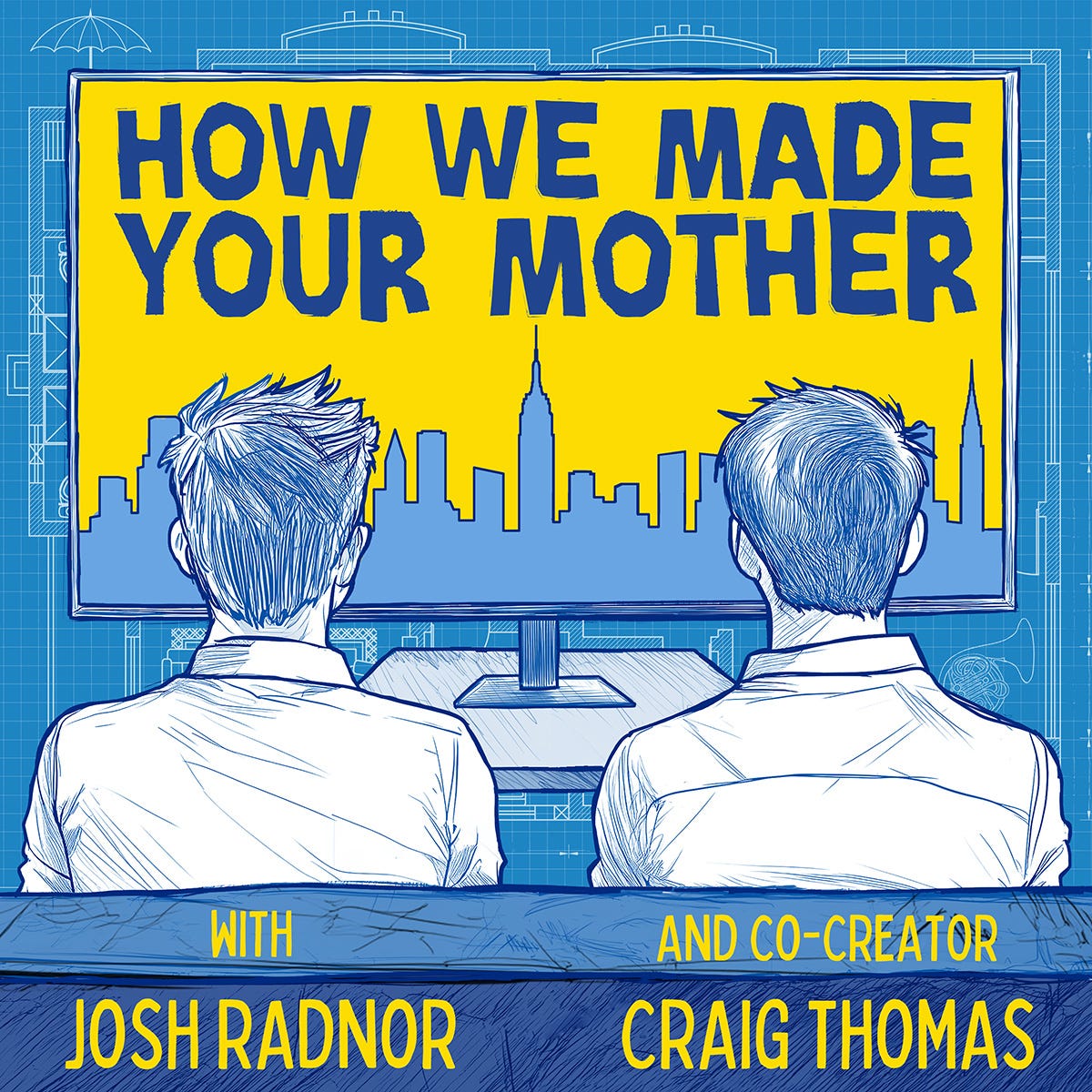ON MINDING WHAT HAPPENS (OR NOT)
How are we to fully accept and surrender to reality as it is without being cold, callous, or indifferent to the vastness of the suffering around us and within us?
When I met my wife she had a small chalkboard in her kitchen upon which she’d written a quote from the philosopher and sage Jiddu Krishnamurti: “Here is my secret. I don't mind what happens.”
I’d come across the quote before but seeing it nearly every day in that apartment led me to chew on its meaning a bit deeper. And I’ve found myself pondering it anew after the devastating fires in Los Angeles which have ravaged a town I lived in and loved for nearly two decades.
If I floated this quote by a Pacific Palisades or Altadena resident who’d just lost their home, their possessions, their children’s school, their church or synagogue, every keepsake and precious heirloom along with every notion of community and safety… they’d have every right to punch me in the face. Offering an ill-timed spiritual platitude to those in grief can be the height of insensitivity.
When I think about our world, rife as it is with war, famine, murder, poverty, climate change, child abuse, income inequality, and then think of Krishnamurti “not minding what happens” something in me wants to cry out “What the f**k do you mean?!” Doesn’t empathy require our hearts to break on behalf of others? And on an individual level what are we to do with chronic pain, discomfort, illness, trauma, the many ways the world warps and wounds us?
But Krishnamurti was no fool. What was he getting at?
Studies have shown that we’re more attracted to bad news than good, that bad news has some kind of sticky quality that adheres to our brains like Velcro. It’s hard to dip one’s toe into the endless feed of news and not come to the conclusion that the world and its inhabitants are headed straight for a cliff. One could make a compelling case, though, that the world is not suffering an absence of good. Just that the bad has a much a better publicist.
I have a friend whom I consider to be one of the more spiritually wise people I know. When Trump won in 2016 and a not insignificant number of U.S. citizens were Googling “How easy is it to move to Canada?” my friend told me something that startled me: “I wouldn’t say this to a lot of people but I’m not upset about the election.” I asked him to elaborate (because I sure was.) “The way I see it is I’m sitting on the bank of the river,” he said. “A Democratic administration floats by. A Republican administration floats by. I wait a little longer and another Democratic administration floats by. The thing is: I don’t get in the river. I just watch it all go by.”
Now my friend is not ‘privileged’ in any of the obvious ways. He wasn’t born on third base thinking he hit a triple. Nor did he come to his serenity by way of monasteries, meditation, and gurus. I trust his spiritual wisdom because it’s been hard-earned, forged in the fires of addiction and recovery. For the last quarter century he has led a sober life of selflessness and service to others. The kind of equanimity he’s describing, to my mind, is not borne of ignorance, spiritual bypassing, or shirking of responsibility.
To me, what it seems my friend has done is dropped the war with reality. I know from personal experience what a liberation this is. When I fight reality, when I wail and moan that things should be going ‘some other way,’ I suffer. When I begin with acceptance and surrender – “Okay this is what is happening right now and where we are” – I don’t suffer. Or at least I suffer far less. And the next right actions are much much clearer than when I’m giving equal weight to each voice in my head.
I believe Krishnamurti when he spills his secret. And in some deep way I believe it is the secret to a more serene life. But I continue to wrestle with this: How are we to fully accept and surrender to reality as it is without being cold, callous, or indifferent to the vastness of the suffering around us and within us?
In December I did a ten-day silent Vipassana meditation retreat in Massachusetts. It was by many orders of magnitude the hardest thing I’ve ever done. Boredom and discomfort have always been big triggers for me, two feelings I run from pretty regularly. These ten days were like exposure therapy for my two least favorite states. No books, no writing, no music, no diversion really of any kind. I was forced to sit with all of it. In silence. I thought a lot about the Danny Boyle film 127 Hours where James Franco’s character gets his arm trapped between two boulders and has to cut it off with a knife. I thought about prison and coffins and death.
The first few days were surreal and challenging and moved glacially slow. On the fourth night I popped awake close to midnight. I’m pretty claustrophobic and the feeling I awoke with was one of entrapment, a few notches short of a full panic attack. There was nowhere to run or turn, no relief from the walls closing in. I stepped outside for a moment to try to calm myself and even the vastness of the night sky provided no relief. There was a course manager a few doors down from my room who was one of the people we could communicate with regarding any physical needs we had during the ten days. I knocked on his door until he woke up and apologetically told him I was panicking. He said he could wake the assistant teacher Barry who was staying on site. I felt terribly about this but I knew I needed to confer with someone. In that moment I lacked the inner resources to talk myself down.
I knew leaving the course early wasn’t an option. I pictured myself driving home racked with shame that I’d broken a commitment to myself, knowing that I’d need to return some day and complete the course. But I didn’t want to repeat the first four days! That’s honestly all that kept me there.
I met with Barry and did my best to describe what was going on. He listened with great patience and sympathy and then said we have these knots that get tied in our psyche throughout our lives. And I had a unique opportunity over the remaining six days to untie some of these knots. He told me to do anapana breathing (focusing on the breath going in and out of the nose) and also to focus on the sensation in the palms of my hands and the soles of my feet.
There was no pill to take, lever to pull, or button to push. I simply had to breathe my way through this.
Back in my room I did as I was told. I lay on the bed and focused on the breath going in and out of the nose. The panic would rise up in me but I continued to focus on the breath and, as instructed, on the palms of my hands and soles of my feet. At some point the panic lifted. In its place was an immense and sudden warmth. It was startling. Forty-five minutes earlier I was unable to catch a deep breath, looking for any way out. And now here I was: my body saturated with peace.
That snapshot - the relatively soft transition from panic to peace - became my anchor for the rest of my time at the retreat. We were taught the law of anicca, which means “impermanence.” It’s a cosmic law which states that all things are in motion, all things are changing, nothing is static. When in meditation, if we felt a pain in our shoulder or the urge to scratch our cheek, we were encouraged to remain still, observe the sensation, and trust that it would pass.
I learned more and more to trust this law of impermanence, that I didn’t have to react so ferociously to every sensation in my body or every triggering thought in my mind. I learned that I could sit with discomfort way longer than I ever thought I could. And not that the discomfort would stay the same or even increase. The revelation was that it would transform. With patience and observation, pain would cease to be labelled “bad.” It would just become another sensation in the body.
The Buddha spoke of the perils of both ‘craving’ and ‘aversion’ and instructed his students to observe the twin sensations dispassionately. This practice showed me how much of my consciousness is dominated by both forces. I’m almost always longing to turn the knobs of my experience somehow: A little more of this, a lot less of this… Labeling, sorting, longing, pushing away. The overarching narrative is perpetual discontent with the present moment.
I know of a woman who is intensely passionate about a certain geo-political crisis. I don’t doubt this woman’s sincerity or her good intentions but I found her social media posts on the subject to be unsettling. The gist was essentially “If you believe as I do come join me, let me hold you close. If you don’t then you can f**k right off.” There was a kind of menace and violence laced through it all. I thought to myself: These are not the words of a peacemaker. This is the language and frequency of war.
Anger has its place and its uses, certainly. Jesus overturning the tables of the moneychangers in the Temple was probably more effective in that moment than a peaceful homily would have been. But anger in the face of anger is often kerosene atop an already raging fire.
I’m reminded of a line from Alan Watts’ The Book: “Peace can be made only by those who are peaceful, and love can be shown only by those who love.” If I want to live in a peaceful, generous, humane world – and I do! – then I have to be peaceful, generous, and humane.
Look: I’m terrified of waking up in a fascist state or that the window to combat climate change is closing and with Trump’s election may have all but closed. But I also know that every generation has its apocalyptic dreads and every doomsday prophet throughout history has been wrong. The clouds of history tend to darken with great regularity yet history keeps chugging along.
I think ‘not minding what happens’ is really more about staying level-headed in much the way the Serenity Prayer outlines: “Grant me the serenity to accept the things I cannot change, the courage to change the things I can, and the wisdom to know the difference.” Much like martial arts, the calmer person—the one who is breathing, who knows how to conserve energy, when to rest and when to strike—has the upper hand.
How then does a quiet mind benefit us in a world this hurting and in need of repair? Maybe it’s in the deepest spaces of contemplation that we receive the best direction, the clearest, most efficient cosmic marching orders. Perhaps wisdom is bequeathed only to those who are still enough to receive it. A person with a quiet mind is not passive, but rather active in the kindest, highest, most effective ways.
It strikes me that the enlightened and the criminally insane have this in common: They both don’t mind what happens. But the wise ‘don’t mind’ with great and compassionate purpose. On the other side of the noise of craving and aversion is the much-sought-after goal: The end of war.
I’m doing a How I Met Your Mother rewatch podcast with my dear friend and HIMYM co-creator Craig Thomas! We’ll be rewatching the whole show, answering all your questions, hearing stories from fans around the world, and (hopefully) making some sense of this wild decade in both our lives. We’ve already taped a bunch of episodes. The official launch is March 10. It’s going to be a blast.
You can listen to the trailer on Apple. Here’s our website (HWMYM.com) with loads of info, how to listen and subscribe, and if you want to share what HIMYM means to you or ask us a question, go to ‘Contact’ and tell us your story. Also please subscribe to our Substack for updates, deep dives, and Q&A’s with me and Craig.
Dory Jackson from People Magazine has been so great to us. First she wrote this beauty: HIMYM Cast Had Fundraising Parties on Set After Co-Creator’s Son Was Diagnosed with Rare Disorder. It’s Now a Fan Event. Then she wrote this terrific piece about the launch of the podcast. And THEN, she spun off our talk about my music and co-wrote a whole different story (which was a total and delightful surprise.)
I’ll write more about the podcast soon but please subscribe and join us March 10.
****
I love Garrett Bucks’ Substack and this is a very good one re: Bishop Mariann Edgar Budde. On the power of staring them directly in the face and repeating a single word.
How I Learned That the Problem in My Marriage Was Me. It took a superstar couples therapist to help me see beyond my anger. By Daniel Oppenheimer
Enjoyed this piece on the hilarious Caleb Hearon: A comedian who delivers jokes with moral clarity and a sharp tongue.
My buddy Connor Beaton’s talk with Michael Meade on his ManTalks podcast is not to be missed: The Importance of Myth and Descent for Men.
This 11 minute TED Talk by Tony Porter bowled me over.
This is a list of GoFundMes for Black Families who lost homes (mostly) in Altadena in the Eaton Fire. Altadena had one of the highest rates of Black home ownership in the country due to red-lining that prevented Black people from buying homes in other areas of L.A.
Verified Fundraisers: GoFundMe has created a centralized page of verified fundraisers for those affected by the fires.
Los Angeles Regional Food Bank: Your donations can help provide food to families in need during this crisis.
Emergency Network Los Angeles (ENLA): Support those who have been evacuated or displaced by donating to ENLA.
Relax
by Ellen Bass
Bad things are going to happen.
Your tomatoes will grow a fungus
and your cat will get run over.
Someone will leave the bag with the ice cream
melting in the car and throw
your blue cashmere sweater in the drier.
Your husband will sleep
with a girl your daughter’s age, her breasts spilling
out of her blouse. Or your wife
will remember she’s a lesbian
and leave you for the woman next door. The other cat—
the one you never really liked—will contract a disease
that requires you to pry open its feverish mouth
every four hours. Your parents will die.
No matter how many vitamins you take,
how much Pilates, you’ll lose your keys,
your hair and your memory. If your daughter
doesn’t plug her heart
into every live socket she passes,
you’ll come home to find your son has emptied
the refrigerator, dragged it to the curb,
and called the used appliance store for a pick up—drug money.
There’s a Buddhist story of a woman chased by a tiger.
When she comes to a cliff, she sees a sturdy vine
and climbs half way down. But there’s also a tiger below.
And two mice—one white, one black—scurry out
and begin to gnaw at the vine. At this point
she notices a wild strawberry growing from a crevice.
She looks up, down, at the mice.
Then she eats the strawberry.
So here’s the view, the breeze, the pulse
in your throat. Your wallet will be stolen, you’ll get fat,
slip on the bathroom tiles of a foreign hotel
and crack your hip. You’ll be lonely.
Oh taste how sweet and tart
the red juice is, how the tiny seeds
crunch between your teeth.







This resonates deeply with me because I’ve try to lived my life with the same motto. I don’t mind what happens.’ Not in a detached or indifferent way, but in the sense of surrendering to reality instead of constantly fighting it. I’ve learned that resisting what is only leads to suffering, while acceptance brings clarity and peace. It doesn’t mean I don’t care or take action, but that I approach life from a place of stillness rather than chaos.
One of the reasons I left Instagram was because I saw so much of that craving and aversion you described, people consumed by outrage, demanding others choose a side or be cast out. It felt like an endless war of opinions, where peace and nuance had no place. I wanted to step away from that noise and live more in alignment with what truly matters.
Thank you, dear ol Kenyon classmate, for one of the best museletters I've read (or perhaps it just arrived in my inbox exactly when I needed to hear ALL of this today). AND THAT ELLEN BASS POEM. Congratulations on everything, Josh. May we all give ourselves permission to celebrate, love, and connect with collective joy even while hanging on a vine between two tigers that is being gnawed on by mice.